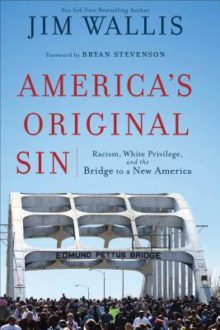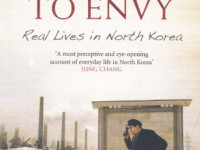 America's Original Sin: Racism, White Privilege, and the Bridge to a New America on January 19, 2016
America's Original Sin: Racism, White Privilege, and the Bridge to a New America on January 19, 2016 Pages: 272
Length: 10 hrs, 9 mins
Read synopsis on Goodreads
Buy the book: Amazon/Audible (this post includes affiliate links)

Do white Christians play a role in perpetuating racism in America and, if so, what can be done about it? These are the questions Jim Wallis explores in his latest book, America’s Original Sin: Racism, White Privilege, and the Bridge to a New America. In it, he explains why racism is incompatible with Christianity and that it’s time for white Christians to work to end racism in America. It’s clear in the first few pages that this is not a book about a post-racial society because we don’t live in a post-racial society, with Bryan Stevenson pointing out in the foreword that “Slavery didn’t end in 1965 – it just evolved.” And so begins a story of racism in America, how Christianity plays its part in perpetuating it, and why “it’s time for white Christians to be more Christian than white.” ![]()
It’s time for white Christians to be more Christian than white.
America’s Original Sin is part narrative non-fiction, part social commentary. The book is organized around Wallis’ own thoughts but his use of Bible verses and statistics raises it above the level of pure opinion. Where Wallis really excels is in his ability to write about such a heavy topic in an approachable way. Although it was published by a Christian press and is about Christianity, it is not a book solely for the religious. In fact, it’s as much for non-churchgoers as it is for churchgoers, and many of the calls to action can be broadly applied.
It’s also not a criticism of Christianity, but rather a criticism of how the Bible is sometimes used to exclude and divide, whether explicitly or implicitly, when it should be used to include and unite. The book is organized around three central themes: racism’s incompatibility with the Bible, repentance, and change, which are discussed below. These are only a few of the issues raised in the book, so if you’re worried that reading the discussions will give away too much, don’t. America’s Original Sin offers a sweeping commentary on everything from Wallis’ own experiences to those of Trayvon Martin and Michael Brown to immigration issues. Religious readers will likely be more impacted by the Bible verses than the non-religious, but Wallis’ calls to action can resonate with anyone.
America's Original Sin is a call to action for Christians to take a stand against racism. Click To TweetIncompatibility
Drawing from very real examples of how racism pervades every aspect of our society, Wallis explains why one cannot live according to the Bible and do nothing about racism. Wallis, who left his own church to re-find his faith only to come back a new man, says that “white privilege is the legacy of white supremacy,” and offers a scathing criticism of those who call themselves Christians but do nothing about it. Pointing to this and male privilege as major sources of many of our problems today, he cites the verse, “the truth shall set you free.” He uses this verse because the reality is that, for many, the truth makes people bitter, deceptive, or defensive, which is the opposite of what the truth should do. He also offers a severe critique of those who take a backseat to action, saying:
“If you call yourself a Christian, read Matthew Chapter 25: 21-46, ‘just as you did it to one of the least of these who are members of my family, you did it to me’, Verse 40, and if you still choose to sit on your behind, burn the Bible, stop going to church, and stop calling yourself a Christian because we can’t serve a man and we can’t talk about a man, Jesus, who was a victim of capital punishment, unless we do something about all forms of punishment, to make them humane, to make them right, and to solve this problem in our country today.”
Repentance
Even so, Wallis remains cautiously hopeful, asking white Christians to acknowledge their roles in perpetuating racism and to repent for their sins. This includes accepting that racism is real and taking personal responsibility for their part in it, both actively and passively, particularly with regard to the racial makeup of churches. Diversity in churches is abysmal and, quoting the Reverend Martin Luther King, “it is appalling that the most segregated hour of Christian America is eleven o’clock on Sunday morning.” Citing Ephesians 3:10, he believes, “silence means we deny our calling to display ‘the wisdom of God in its rich variety’ through our unity and reconciliation.”
And so, with acceptance comes repentance and it is time to recognize the very real ways that racism presents itself, from the presumption of guilt and higher incarceration rates to the unemployment rates and the oppressive effects of white privilege. To believe one is exempt from taking action because they are not actively racist is reprehensible and it is up to all Christians to demand and foster change.
Change
A multiracial body of Christ is not only admirable, it is intrinsic, mandated, and expected by God.
Acceptance and repentance are important, but true repentance requires change. Here, Wallis discusses the ways in which white Christians can do better, including ending the school to prison pipeline and striving for more diverse and inclusive places of worship because “a multiracial body of Christ is not only admirable, it is intrinsic, mandated, and expected by God.” More than that, he believes that you can have, “a segregated church or a beloved community. You can’t have both…” Pointing to churches striving for inclusiveness, he is hopeful that with acceptance and repentance, change and redemption is possible. The question is, will white Christians do their part?
Recommended for: Socially aware readers who aren’t afraid to hear some harsh truths.









